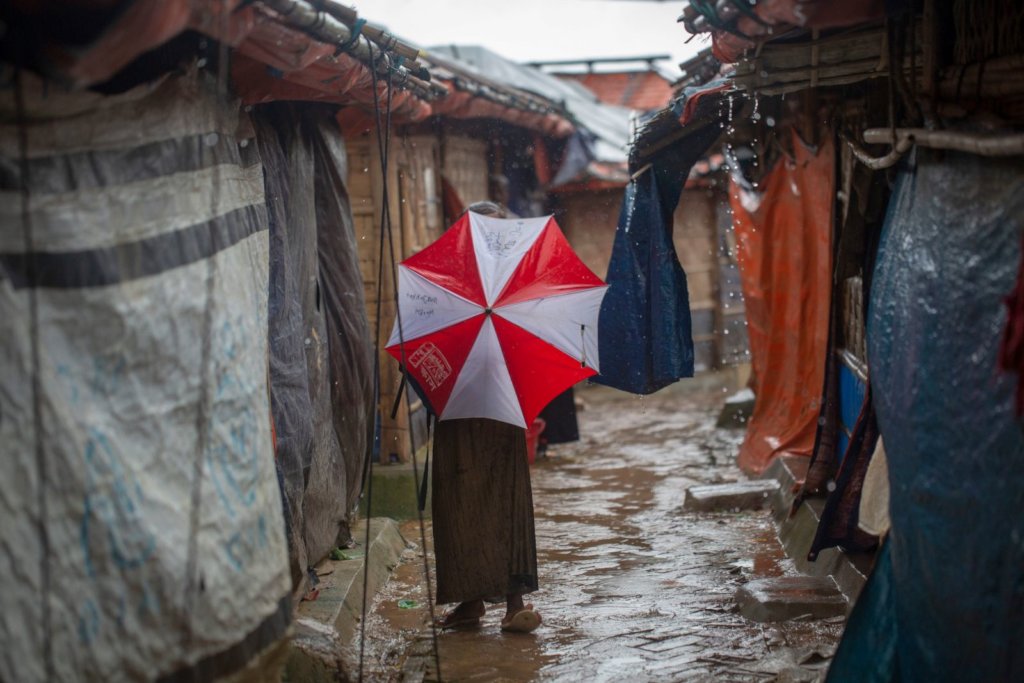By Hillol Sobhan | Head of Communications, CARE Bangladesh and Asia
The global death toll from the coronavirus has crossed 800,000 as confirmed cases surged past 23 million, with Bangladesh overtaking Pakistan to become 15th on the list of countries with most COVID-19 patients. While the country has crossed a grim milestone, there are so far fewer causalities in the densely-populated Rohingya camps that have been and still are considered one of the most vulnerable places to the ongoing pandemic.
As of now, COVID-19 situation across the camps has been tackled somewhat successfully. However, the apparent success in keeping the virus away should not hide the fact that the risks of a COVID-19 outbreak in the camps remain very high. Despite taking all the preventative measures, it cannot fully alleviate the very difficult conditions continually present in the camps.
Coordinated approach by the Bangladesh Government, UN organizations and NGOs including CARE has yielded results. CARE is currently responsible for co-managing three camps (Camp 13, 14 & 16) under the supervision of Camp-in-Charge (CIC) appointed by the Government.
As an early responder, CARE intervened to ensure that the Rohingya population and the host community members have access to life saving and essential services to fight COVID-19. CARE continued with the services e.g. related to health, water and sanitation, and Gender Based Violence where community engagement sessions were also organized to sensitize women, girls, men and boys as well as community level actors to create awareness on prevention and control methods for COVID-19. Staff and community volunteers are being trained on infection prevention and control (IPC) to strengthen knowledge and skills on safe delivery of response package at all levels.
Along with a COVID-19 response from March 2020, CARE has implemented a number of programs to reach 334,227 people in the past three years. CARE especially targeted the most vulnerable groups like elderly, unwell, care-givers and people with disability for offering life-saving services. While establishing over 1,000 gender-segregated latrines in camps, a total of 91 accessible latrines were constructed for families with persons with disability. “Previously, the latrine I had to use was 20 feet away from my house. I used to face a lot of difficulties then”- shared Bashir who is 17 and visually impaired.
Apart from working with health, water, sanitation, protection and gender-based violence issues, CARE has also worked on nutrition issues extensively. CARE provided training and capacity building support to 11 partner organizations responsible for implementing community based management of acute malnutrition (CMAM). Over 2000 staff members from these agencies were trained to provide CMAM services across 29 out of 34 Rohingya camps.
However, COVID-19 threatens to roll back gains made on nutrition in the camps as access to food supplies, income and diverse diets become more limited. According to Nutrition Sector1, progress has been made since the onset of the crisis in August 2017, when over 700,000 Rohingya people fled from Myanmar seeking shelter and safety in Bangladesh. Global acute malnutrition among children under five has reduced from 19.3 percent in 2017 to 10.9 per cent in 2019. It is evident that COVID-19 compromises the fragile gains made over the past three years.
Aside from COVID-19, people living in the camps also face the threat of cyclone and landslide during the monsoon period; usually between June and October. The conditions in the camps have made Rohingya communities at particular risk of disasters. The strain on services, infrastructures and the environment from the influx has also increased the vulnerability. The exposure of these communities to extreme weather events would exacerbate already existing needs and vulnerabilities, especially for the most marginalized, including women and girls, persons with disabilities, elderly persons and children.
“Close to a million Rohingya refugees are living in highly overcrowded camps in the Cox’s Bazar region of Bangladesh. So far with the collective effort of all humanitarian agencies and the government we have been able to limit the spread of COVID-19 successfully. However, the risk still remains and we need to keep working with the communities on food and nutrition security, creating health awareness while reinforcing our disaster preparedness activity”- said Ram Das, Deputy Country Director – Humanitarian Response of CARE Bangladesh.
About CARE: Founded in 1945 with the creation of the CARE Package®, CARE is a leading humanitarian organization fighting global poverty. CARE places special focus on working alongside poor girls and women because, equipped with the proper resources, they have the power to lift whole families and entire communities out of poverty. Last year CARE worked in 100 countries and reached more than 50 million people around the world. To learn more, visit www.care.org and www.care-international.org.
Links:
Project reports on GlobalGiving are posted directly to globalgiving.org by Project Leaders as they are completed, generally every 3-4 months. To protect the integrity of these documents, GlobalGiving does not alter them; therefore you may find some language or formatting issues.
If you donate to this project or have donated to this project, you can receive an email when this project posts a report. You can also subscribe for reports without donating.
